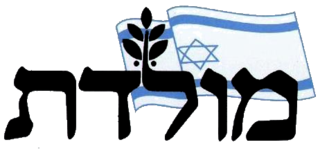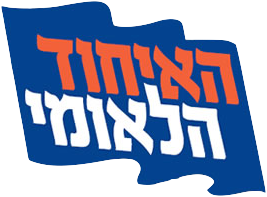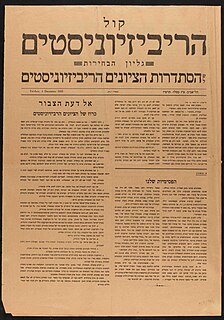Paul Eidelberg (born 1928) is an American-Israeli political scientist, author and lecturer, and is the founder and president of The Foundation for Constitutional Democracy, with offices in Jerusalem. He is also president of the Yamin Yisrael Party.
Eidelberg served in the United States Air Force where he held the rank of first lieutenant. He received his doctoral degree at the University of Chicago where he studied under Leo Strauss. He designed the electronic equipment for the first brain scanner at the Argonne Cancer Research Hospital.[ citation needed ]
Before immigrating to Israel in 1976, Eidelberg wrote a trilogy on America’s founding fathers: The Philosophy of the American Constitution ( ISBN 0819153419), On the Silence of the Declaration of Independence ( ISBN 0870232169), and a Discourse on Statesmanship ( ISBN 0252004280).
In 1976 he joined the faculty of Bar-Ilan University,[ citation needed ] and holds adjunct positions at Otago University in New Zealand and The University of Georgia.
He has written several books on the Arab-Israel conflict and on Judaism. Demophrenia ( ISBN 093345127X) analyses the mentality of Israel’s ruling elites. Jewish Statesmanship: Lest Israel Fall ( ISBN 0761823808), which has been translated into Hebrew and Russian, discusses what he sees as the flaws inherent in Israel’s system of governance and how they may be remedied. His work, A Jewish Philosophy of History ( ISBN 0595316956), investigates the world-historical events leading to the rebirth of Israel in 1948.
Eidelberg is on the Advisory Council of the Ariel Center for Policy Research , which has published many of his policy papers. In addition to writing more than 1,000 articles for newspapers and scholarly journals in the U.S. and Israel, he is a weekly guest on The Tamar Yonah Show on Arutz Sheva radio.
In 2003, Eidelberg's Yamin Yisrael ran with Herut – The National Movement for the Knesset elections of that year. The joint list fell 8,000 votes short of the electoral threshold. After the elections Herut and Yamin Yisrael parted ways.
In 2005, Yamin Yisrael merged with the Jewish National Front. Eidelberg stood number seven on the JNF's list for the Israeli Knesset for the 2006 election. The party did not pass Israel's electoral threshold. Yamin Yisrael and the JNF have since parted ways due to political and ideological differences.
Eidelberg has a weekly column in the Jewish Press, a leading American Orthodox Jewish newspaper.
Eidelberg has published numerous papers and articles. Some of his published books include:

Moledet was a minor right-wing political party in Israel.
Likud, officially known as Likud – National Liberal Movement, is the major center-right to right-wing political party in Israel. A secular party, it was founded in 1973 by Menachem Begin and Ariel Sharon in an alliance with several right-wing parties. Likud's landslide victory in the 1977 elections was a major turning point in the country's political history, marking the first time the left had lost power. In addition, it was the first time in Israel that a right-wing party won the plurality of the votes. However, after ruling the country for most of the 1980s, the party lost the Knesset election in 1992. Nevertheless, Likud's candidate Benjamin Netanyahu did win the vote for Prime Minister in 1996 and was given the task of forming a government after the 1996 elections. Netanyahu's government fell apart after a vote of no confidence, which led to elections being called in 1999 and Likud losing power to the One Israel coalition led by Ehud Barak.

The National Union was an alliance of right-wing and nationalist political parties in Israel. In its final full form, the alliance consisted of four parties: Moledet, Hatikva, Eretz Yisrael Shelanu, and Tkuma. Leading up to the 2013 Knesset elections, only Tkuma remained, and joined The Jewish Home. During its existence, it had also included Ahi, Herut – The National Movement, the Jewish National Front, and Yisrael Beiteinu.
Mapai was a democratic socialist political party in Israel, and was the dominant force in Israeli politics until its merger into the modern-day Israeli Labor Party in 1968. During Mapai's time in office, a wide range of progressive reforms were carried out, as characterised by the establishment of a welfare state, providing minimum income, security, and free access to housing subsidies and health and social services.

Revisionist Zionism was an ideology developed by Ze'ev Jabotinsky, who advocated a "revision" of the "practical Zionism" of David Ben-Gurion and Chaim Weizmann which was focused on the settling of Eretz Yisrael by independent individuals. Revisionism differed from other types of Zionism primarily in its territorial maximalism. Revisionists had a vision of occupying the full territory, and insisted upon the Jewish right to sovereignty over the whole of Eretz Yisrael, which they equated to the whole territory covered by the League of Nations Mandate for Palestine, including Transjordan. It was the chief ideological competitor to the dominant socialist Labor Zionism.

Baruch Meir Marzel is an Israeli politician and activist. He is an Orthodox Jew originally from Boston who now lives in the Jewish community of Hebron in Tel Rumeida with his wife and nine children. He was the leader of the far right-oriented Jewish National Front party. He is now a member of Otzma Yehudit. He was the "right-hand man" of assassinated Rabbi Meir Kahane, acting as spokesman for the American rabbi's Kach organization for ten years. The mainstream Israeli press has described him as an "extreme right-wing activist".

Jewish National Fund was founded in 1901 to buy and develop land in Ottoman Palestine for Jewish settlement. The JNF is a non-profit organization. By 2007, it owned 13% of the total land in Israel. Since its inception, the JNF says it has planted over 240 million trees in Israel. It has also built 180 dams and reservoirs, developed 250,000 acres (1,000 km2) of land and established more than 1,000 parks.

Herut was the major conservative nationalist political party in Israel from 1948 until its formal merger into Likud in 1988. It was an adherent of Revisionist Zionism.
The Religious Zionist Party, formerly known as Tkuma, until 2021 and officially still known as National Union–Tkuma, is a far-right religious Zionist political party in Israel.

Agudat Yisrael is an ultra-Orthodox Jewish political party in Israel. It began as a political party representing ultra-Orthodox Jews in Poland, originating in the Agudath Israel movement in Upper Silesia. It later became the Party of many Haredim in Israel. It was the umbrella party for many, though not all, Haredi Jews in Israel until the 1980s, as it had been during the British Mandate of Palestine.
The General Zionists were a centrist Zionist movement and a political party in Israel. The General Zionists supported the leadership of Chaim Weizmann and their views were largely colored by central European culture. Their political arm is one of the ancestors of the modern-day Likud.
The Jewish National Front, commonly known in Israel by its Hebrew acronym, Hayil, was a religious far-right political party in Israel.
Elections for the 17th Knesset were held in Israel on 28 March 2006. The voting resulted in a plurality of seats for the then-new Kadima party, followed by the Labor Party, and a major loss for the Likud party.

Early general elections for both the Prime Minister and the Knesset were held in Israel on 17 May 1999 following a vote of no confidence in the government; the incumbent Likud Prime Minister Benjamin Netanyahu, ran for re-election.
Eleonora Shifrin is chairwoman of the Yamin Yisrael party, and is also news editor for SedmoyKanal.com, the Russian-language website for Arutz Sheva.
Yamin Yisrael was a minor right-wing political party in Israel.

The Fighters' List was a political party in Israel.

Israel Katz is an Israeli politician who currently serves as a member of the Knesset for Likud. He was a member of the Security Cabinet of Israel. He has previously held the posts of Minister of Agriculture, Minister of Transportation, Minister of Intelligence, Minister of Foreign Affairs and Minister of Finance.
The Movement for Greater Israel was a political organisation in Israel during the 1960s and 1970s which subscribed to an ideology of Greater Israel.
The Israeli Labor Party, commonly known as HaAvoda, is a social democratic and Zionist political party in Israel. The party was established in 1968 by a merger of Mapai, Ahdut HaAvoda, and Rafi. Until 1977, all Israeli Prime Ministers were affiliated with the Labor movement. The current party leader since January 2021 is Merav Michaeli.